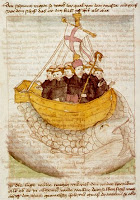
One of the most appealing aspects of Celtic Christianity, are the lives of its many, and I mean "many" saints. This in itself says something positive in the way it transformed all kinds of people. Reading hagiography (holy biographies) does not come naturally for someone with a Protestant background. Then again, they are not much different than the genre of Foxe's Book of Martyrs. And I feel better for reading these accounts of Celtic holy men and women. Their stories and adventures have stuck with me through the years.
I fell in love with the story of Brendan, when I first read The Voyage of St. Brendan seven years ago. The Navigatio Sancti Brendani, I love that Latin title, was one of the most popular books of the Middle Ages. And with good reason. The book is an adventure tale, as Brendan was regarded as one of the world's great travelers. It's both fun and entertaining to read, and borders on fantasy literature. The story describes Brendan's journey in search of the "Promised Land of the Saints". The book details several of Brendan's voyages, which take him far past the comfortable environs of Ireland. Sections describe volcanoes, icebergs and encounters with great sea monsters. One tale includes an Easter spent on the back of a whale. Jonah would be jealous. So would Sinbad. Some even suggest Brendan got as far as the New World in his tiny coracle. Think of it, instead of Columbus Day (which is coming up this Monday) it could have been St. Brendan's Day.
Like many of the Celts, wanderlust was in Brendan's viens. Ironically, Brendan had been inspired on his voyages by the Desert Fathers, yet he sought "a desert in the ocean". He wanted to travel for God, and from an early age desired to travel far from his home, a practice common to the Celts known as "white marytrdom". In leaving what was familiar and going wherever the Spirit dictated, Brendan found God anew, over and over agan. Brendan should be the parton saint of adventure. He knew, long before us moderns, that the most important part of the journey is not the destination, but the journey itself.
"Is not the Lord our captain and helmsman?
Then leave it to Him to direct us where He wills."
St. Brendan



No comments:
Post a Comment